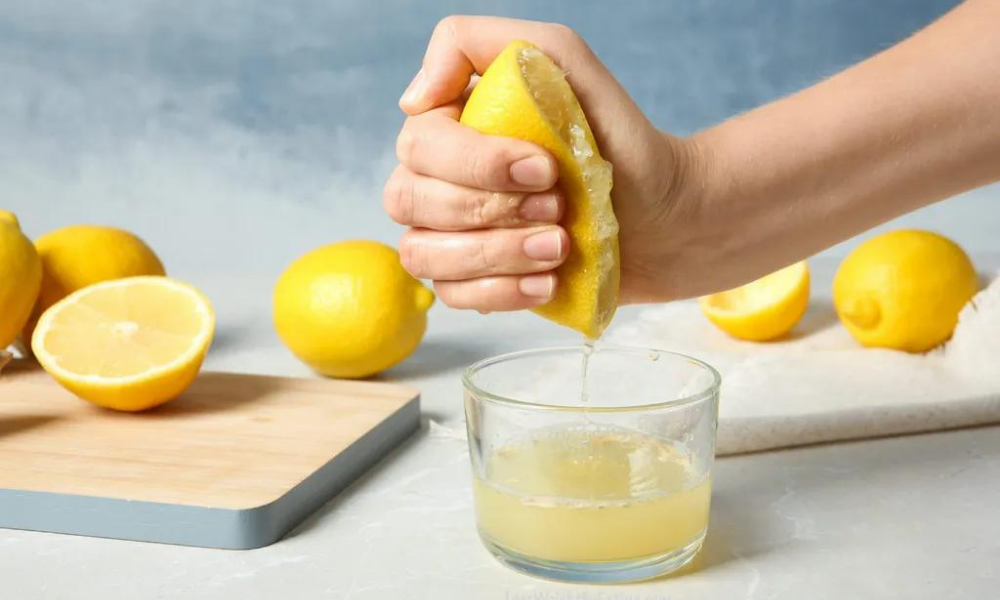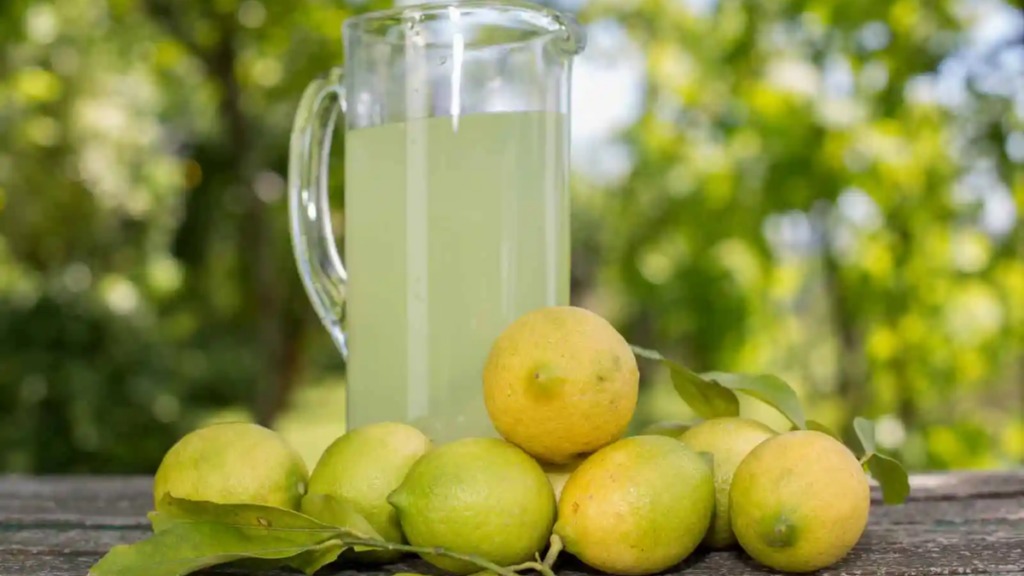Even though lemon juice is a very acidic substance, it can spoil, and if it’s a preservative-free lemon juice, it spoils quickly, especially if kept at room temperature. Lemon juice is a popular juice generally consumed in modest quantities, and it’s helpful to know whether lemon juice spoils and how long it lasts. The most significant facts regarding lemon juice will be presented in this post.
The hue of spoiled juice shifts to a deeper yellow. You’ll notice that the tanginess has gone flat when you taste a tiny bit. It will also have an unpleasant odor. It should be thrown away right away. Because fresh lemon juice contains no preservatives, it will degrade faster than bottled lemon juice. If refrigerated in the fridge, don’t keep freshly squeezed juice for more than three days. Lemon juice from a commercial bottle that has been opened and refrigerated will last around six months. Unopened bottles do not need to be refrigerated.
What Is Lemon Juice?
Lemon juice is obtained by crushing the fruit’s pulp. Lemon juice is most typically used in lemonade, a drink made from lemon juice, water, and sugar. All across the world, the juice is used for various culinary and non-culinary uses. The acidic level of the juice varies depending on the fruit variety. Many restaurants offer it regularly, and some people prefer it to coffee or tea to start their day. Lemons are tasty, but does adding them to water make you healthier? The evidence for lemon water’s health benefits is primarily anecdotal. Although there has been little scientific research on lemon water specifically, there has been researching on the advantages of lemon and water individually.
How To Tell If Lemon Juice Is Bad?
Like other juices, lemon juice degrades quality before it goes bad. Here are some easy signs to tell if lemon juice is gone bad:
- The process is relatively gradual for unrefrigerated bottled lemon juice. Slowly but steadily, the juice deteriorates.
- You wouldn’t notice those minor differences if you drank the juice every day. The changes are easier to see if the bottle is left unused for a few months.
- It doesn’t smell as good as it used to, and the flavor has changed. You may find that the juice is no longer fit for consumption at some point, in which case you should discard it.
- The same goes if you observe any typical indicators of deterioration, such as a sourer-than-usual odor, a change in color, mold, or a tasteless juice.
- Just a smidgeon of a sip. Again, if there are any strange flavors other than the classic lemon flavor, it’s best to throw them out. Sour juice can also lose its inherent flavor, so if your juice tastes weirdly bland, it’s most likely past its prime.
- If you’re going to use old lemon juice in a baked recipe, be sure it’s in good shape first. So you don’t ruin the whole process by mistakenly adding rotten lemon juice.
Check three things to see whether your lemon juice is terrible: its appearance, odor, and taste. Discard it if it has turned dull or darker. If the odor or flavor has changed noticeably, proceed in the same manner.
How To Store Lemon Juice?
Lemon juice from the shop should be stored in the same manner as other juices such as apple juice or lime juice. It should be kept cool and dark, away from heat sources. If it’s a clear plastic bottle, keep it out of direct sunlight. The pantry is ideal, but a kitchen cabinet will suffice as well.
While you’ve opened the bottle or container, make sure it’s tightly shut when it’s not in use. Second, remember to keep it refrigerated for the best benefits. While store-bought juice has additional preservatives and citric acid, which is a preservative in and of itself, the quality of the juice degrades far faster at ambient temperature than it does in the fridge.
For the lemon juice, freezing is also an option. You can thaw as much juice as you need for a dish if you freeze it in ice cube trays. Alternatively, toss a cube or two into a glass of water for a refreshing drink on a hot day. When it comes to fresh lemon juice, whether you squeezed it yourself or bought it in the refrigerated department, keep it in the fridge.
How Long Does Lemon Juice Last?
Unrefrigerated lemon juice is usually created from concentrate that has been diluted with water to mimic the taste of fresh lemon juice. Jif and ReaLemon, two well-known brands, use this method to make their juices. In addition to the concentrate and water, preservatives (typically sulfites) are added, and the entire mixture is pasteurized to eliminate any bacteria that may have been present. Because of the way the juice is made lasts a long time and doesn’t need to be refrigerated until it’s opened.
- Almost every bottle of lemon juice has a best-by or best-before date on it. That date indicates how long the juice will remain fresh, at the very least.
- That date is a conservative estimate, and the juice should keep its quality for a few more months. It’s tough to say precisely how long it’ll be fine, but it’ll probably be around 3 to 6 months.
- After opening the bottle, the juice should keep its quality for an extended period. Refer to the date on the label, according to ReaLemon. So, unless the juice is close to the expiration date on the label, it should be OK to consume for another 6 to 12 months.
- Let’s compare freshly squeezed lemon juice to store-bought lemon juice kept chilled. Because such juices are usually devoid of preservatives, they don’t last very long.
You should use homemade lemon juice within 2 to 3 days, and the store-bought one should last a little longer, perhaps 4 to 5 days. Although it’s ideal to use all fresh juice immediately away, this isn’t always possible.
Can Old Lemon Juice Make You Sick?
Whether consumed directly or incorporated into food, expired lemon juice can result in severe food illness. Bacteria, mold, and yeast can contaminate lemon juice if it is not stored correctly or allowed to go past its best date, providing a danger of poisoning. Food poisoning symptoms will appear within 1-2 days of eating the juice.
You may experience fever, chills, weakness, abdominal discomfort, nausea, headache, and diarrhea. If the symptoms persist for more than 24 hours, contact your doctor. If you develop indications of dehydration, you should seek medical help right once. Fresh juice is especially susceptible to contamination, and juice left open in the fridge for longer than a day should be discarded to reduce the risk of food poisoning.
Treatment
Modifying your diet and consuming extra water are the most effective treatments for diarrhea caused by drinking expired lemon juice. Consume minor amounts of bland foods to help bulk up your stools. Bananas, rice, applesauce, toast, cooked carrots, skinless chicken, and boiling potatoes are some foods you can eat. Yogurt contains beneficial bacteria that can help your body fight an infectious organism. To avoid dehydration, drink more clear drinks. Caffeinated beverages and alcohol dehydrate your body, so avoid them.
Conclusion
Lemon juice is a versatile condiment that preserves typically well. Freezing is the way to go if you have too much or want to keep enough for later use. To increase the shelf life of fresh juices and avoid poisoning, handle them with extreme caution. When stored properly, opened lemon juice that has been sold unrefrigerated and contains preservatives will keep its best quality for around 12 to 18 months in the refrigerator.
Still, it will usually be OK to use after that. Warm lemon water in the morning has been shown to help kick-start your digestive system. That implies that any food eaten after the lemony drink will be easier to digest, and the nutrients will be absorbed more effectively. According to the National Library of Medicine, lemons have characteristics that help gut health.

